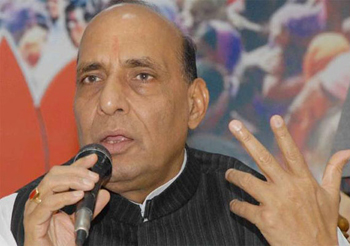
New Delhi, Jan 31: On a day when newly elected BJP president Rajnath Singh advised party people to refrain from making public statements, Rashtriya Swayamsevak Sangh (RSS) ideologue M G Vaidya revisited embarrassing old wounds by claiming that former chief Nitin Gadkari was a victim of an “internal political conspiracy”.
“There seems to be an internal political conspiracy over the turn of events preceding Gadkari's resignation,” veteran Vaidya posted in his latest blog.
After visiting BJP headquarters at Ashoka Road on Wednesday, party president Rajnath Singh advised party leaders and workers not to say things publicly given the series of statements coming from leaders like Yaswant Sinha and Ram Jethmalani for making Gujarat Chief Minister Narendra Modi the prime ministerial candidate.
Singh was of the view that “leaders should maintain good speech and conduct... They should have patience,” as the Modi for PM chorus is growing louder with even NDA ally Akali Dal giving their nod to the Hindutva poster boy’s name.
When asked to comment on Vaidya’s blog, he avoided a direct reply. “I have not read it. So, I would not like to comment on it,” Singh remarked.
Vaidya saw a sinister pattern in the voices raised against the former BJP president. “The way the Jethmalani father-son duo started a campaign against Gadkari sometime back, shows something. At that time, Gadkari had not even received a single notice from any of the authorities, but to the Jethmalanis, Gadkari appeared as “kalankit” (tainted). But this kalank (taint) was not proved. After that, Shatrughan Sinha and Yashwant Sinha also demanded Gadkari’s resignation,” the RSS leader blogged.
“When all this was going on and I wrote it in my blog, I received a letter from Washington. The first line in that letter was ‘I am saddened by your support to Gadkari’. That letter cleared my doubts and made it clear that this was an internal conspiracy against Gadkari,” he added.
Earlier, Vaidya had accused Modi of being the brain behind the smear campaign to oust Gadkari. He had charged in his earlier post that Jethamalani’s demand of removing Gadkari and making Modi as PM candidate suggested that the plot was hatched in Gujarat. Interestingly, at that point of time, the RSS had distanced itself from Vaidya’s comments describing them as his personal views.
The RSS leader is of the opinion that “Gadkari would have scored 70 of per cent votes had he contested polls for the second term”. Singh occupied the throne unopposed after Gadkari pulled out from the race owing to the Income Tax case and threat of other leaders contesting the polls.
“When the BJP amended its constitution to facilitate extending a second term to incumbent president Gadkari, a section of party leaders did not like it. But they did not oppose it openly and since then started working against giving second term to Gadkari”, Vaidya wrote in his blog.
Meanwhile, Singh is holding a series of consultations with senior party leaders to have consensus on the new team he is supposed to constitute and announce after holding the national executive and national council meetings in the middle of next month. He met Sushma Swaraj on Wednesday for an hour to discuss this issue apart from problems faced in other BJP-ruled states, said sources.





Comments
Add new comment